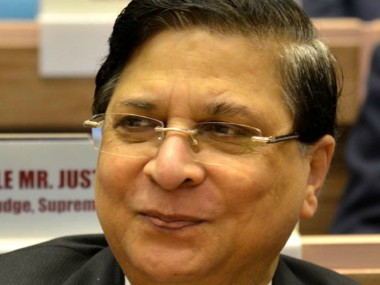Chief Justice of India (CJI) Dipak Misra has appealed the Supreme Court (SC) and high courts to take cases pending for more than five years on a priority basis and speedily decide on appeals filed by people lodged in jails for a similar period, said media reports. According to a
The Times of India report, Misra wrote a letter to the chief justices of high courts and his peers in the apex court providing them with the guiding framework to deal with a large number of criminal appeals pending in these courts. [caption id=“attachment_4191271” align=“alignleft” width=“380”] File photo of Chief Justice of India Dipak Misra. News18[/caption] “Delay in disposal of these appeals raises a question about the efficacy of the administration of justice as a whole and [the] criminal justice system in particular,” Times of India quoted Misra as saying in his letter. The report said that the CJI has initiated a unique step that requires state legal services authorities to provide an advocate free of cost to poor jail inmates. According to The Financial Express, after Misra took over as CJI in August this year total pendency in Supreme Court has come down by 2,174 cases. When Misra took over as the CJI the total pendency of cases stood at 57,774,
The Tribune reported. Between 28 August and 27 October, 2017 the number of cases filed stood at 7,021 while 9,195 cases were disposed of, the report said. In September, high courts of Odisha, Jharkhand, Madhya Pradesh, Bihar and Karnataka had constituted special benches to hear criminal appeals in cases where the accused had got a lawyer at the expense of the state,
Hindustan Times had reported. The move had come following the letter from Misra to high court chief justices, pointing to the necessity of giving priority to such cases. In order to achieve the target of hearing appeals not more than five years old, the CJI had suggested early hearings to criminal appeals filed directly by inmates languishing in jails.
Chief Justice of India (CJI) Dipak Misra has appealed the Supreme Court(SC) and high courts to take cases pending for more than five years on priority basis
Advertisement
End of Article


)




